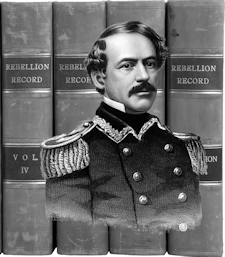January 29. — At sundown last night General Heintzelman sent fifty of the New-York Thirty-seventh, under Lieutenant-Colonel John Burke, to capture some rebels, who were at Porter’s, near Occoquan Bridge, Va. They had to march ten to eleven miles through mud, and reached there about one o’clock this morning. A dance was progressing in the house, which was frame, and covered with clapboards. A gun was fired, and they were ordered to surrender. They immediately refused, and opened fire on the National troops through a window, and then made port-holes through the sides, hoping that their firing would be heard by their comrades, and aid come to them. After considerable random firing, a whole platoon fired through the weather-boards, and in a few minutes afterwards the firing ceased, and some one cried out they had surrendered. On examination it was found that inside were bodies of nine privates and one major, of the Texan Rangers, and one civilian dead. The man of the house, Porter, about seventy years old, was taken upstairs, with a musket, which he had been using from a window. The one who surrendered was a civilian, and he said he had been fiddling for a stag-dance; that he was a Union man, and did not fire a gun, but wanted them to surrender at first. The Nationals had one man killed and four wounded. They had the advantage of darkness to cover them, and only could be seen when a gun flashed in firing, while they never put out their lights. Thus not a rebel escaped to tell the tale, unless they had some outside as pickets.[1]
—Mason and Slidell arrived at Southampton, Eng., this morning. They embarked on board the British ship Rinaldo, at Boston, bound for Halifax. Owing to a furious gale, the Rinaldo could not make Halifax, and after trying ineffectually for four days to do so, she ran for Bermuda. Here the English admiral offered to send the commissioners home in Her Majesty’s ship Racer, or convey them to St. Thomas to catch the West-India packet. The latter course was preferred.
They acknowledge having been treated in the most handsome manner on board the Rinaldo, and at Bermuda by the British authorities.
They were received at Southampton by the officers of the Confederate steamer Nashville and other gentlemen. A large crowd gathered together in the dock to catch a glimpse of men who had caused such anxiety, but no demonstration was made on their landing.—Manchester Guardian, January 30.
—The Twelfth regiment of Iowa Volunteers, under command of Colonel Jackson J. Wood, arrived at Smithland, Ky., to-day.
—The House of Delegates of Virginia passed resolutions in secret session, thanking, in appropriate terms, General Jos. E. Johnson for his distinguished services, and conferring, as a slight testimonial of appreciation by the Legislature, the right for life of annually appointing two cadets to the State Military Institute.—Norfolk Day Book, January 31.
—The rebel Major-General Earl Van Dorn, issued an order assuming command of the Trans Mississippi District Department, embracing the State of Arkansas, part of the State of Missouri, the Indian Territory west of Arkansas, and the State of Louisiana as far south as Red River. The headquarters of the department are at Pocahontas, Ark.—(Doc. 22.)
[1] The following acknowledgments of bravery in this action were made public soon after It occurred:
Headquarters Army of the Potoma,
Washington, Jan. 31, 1862.
The Commanding General thanks Lieutenant-Colonel John Burke, Thirty-seventh New-York Volunteers, and the handful of brave men of that regiment, and the First New-Jersey Cavalry, under his command, for their services in the affair at Lee’s house, on Belmont or Occoquan Bay, on the night of the 28th Inst. Their coolness under fire, and the discretion and judgment displayed by Lieutenant-Colonel Burke, have won the confidence of the Commanding General, who recognizes hi these qualities the results of discipline and attention to duty.
By command of Maj.-Gen. McClellan.
S. Williams, A. A. G.
J. M. Norvell, A. A. G.
Headquarters Division, Fort Lyon, Va., Jan. 300,1862
General Orders, No. 2:
The General commanding the Division takes pleasure in commending Lieutenant-Colonel John Burke, of the Thirty-seventh New-York Volunteers, the officers and men with him, together with the guide, Williamson, for the gallantry and good conduct displayed by them in destroying a party of Texan Rangers, located at Mrs. Lee’s house, on the banks of the Occoquon, and in sight of the rebel batteries. It is to be regretted that after all resistance had ceased, a more thorough search was not made of the house to discover the actual loss of the enemy, and to bring away all their arms.
By order, Brig.-Gen. Heinzelman.
Isaac Moses, A. A. G









